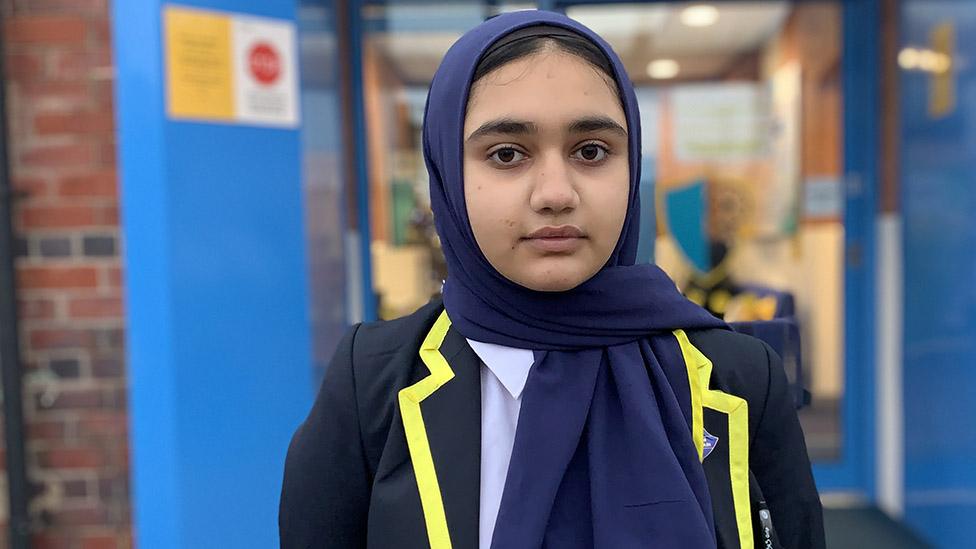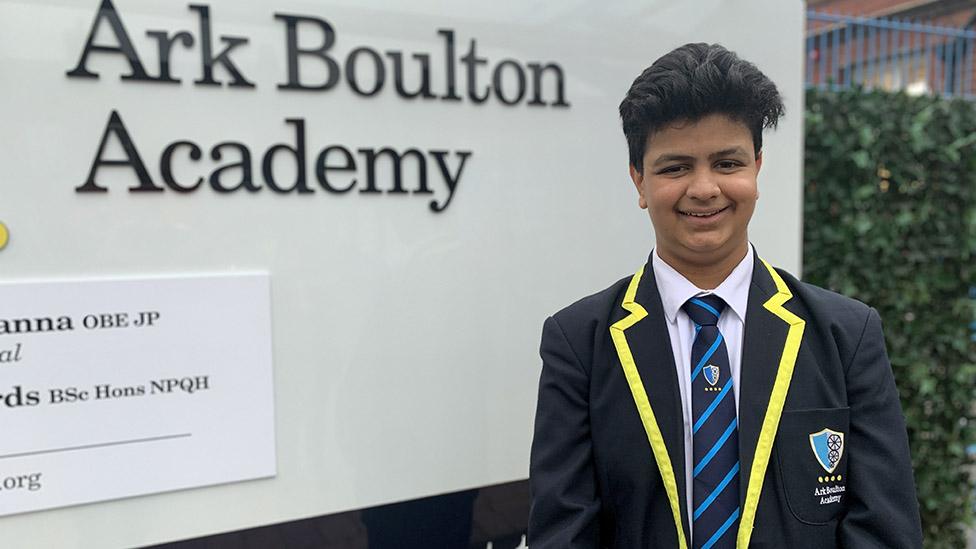Chaperones help keep pupils safe on school walk
- Published

Head girl Areeba Ahsan said pupils should feel safe going to school
Children are being helped by adult chaperones on their way to and from school in high-crime inner city areas.
The £1.2m project is being piloted in the West Midlands with support from the Home Office and the Police and Crime Commissioner.
Participating schools were selected on police intelligence about criminal activity in their neighbourhoods.
It is based on a successful scheme which helped reduce crime in the US city of Chicago.
Among the schools taking part in the scheme - called Step Together - is The Ark Boulton Academy, a secondary school in the inner-city Sparkhill area of Birmingham.
At the beginning and end of the day a small group of adults gather at the school gates to act as chaperones for the children as they walk between home and school. Others are stationed in nearby parks.
The school was chosen, along with more than a dozen others in the West Midlands police force area, because there have been problems with anti-social behaviour and gang crime nearby.
Danny Richards, the school's head teacher, hopes the scheme will provide pupils with added reassurance about their safety.
He said: "The chaperones are in the prominent places if you like, so they are easily identifiable by the students. They are on key routes home and also in areas that are known hot spots."
The idea is to offer children a point of safety, and to act as a deterrent to anyone intent on wrongdoing.
The West Midlands has been blighted by attacks on teenagers in the hours after school in recent years.
Keon Lincoln, 15, was murdered outside his home in Handsworth 12 months ago, and in December, 18-year-old Yahya Sharif was stabbed to death in Small Heath.

Muhammad Al-Muzamil is aware that the streets can be dangerous
Muhammad Al-Muzamil, the head boy at Ark Boulton Academy, said he believed the presence of the chaperones has made students feel safer.
"Thankfully, none of us ever been involved in such violence across the streets," he said.
"But we do know... well the dangers of the world are out there, and you want to be protected in such situations."
Areeba Ahsan, the head girl, said that if there was a problem it would be easier for teenagers to to speak to an adult that they know.
"Every student should get the chance to go home safely. It's more scary to go to a stranger to ask for help."
The chaperones come from groups who already have a presence in the areas they operate in, as well as a relationship with the schools.
In Sparkhill, they come from the youth development programme, Make A Difference. They do an hour pre-school and several post-school, as well as a day's work in-between.
Callam Dunne, one of the chaperones, took me to one of the parks they patrol. It is where locals gather to play impromptu games of football and cricket, but there have been problems here too.
Weapons are regularly found stashed in the undergrowth, including a machete which was retrieved recently.
He said: "When bad things happen, it's not often in the eyesight of the public. That's why green areas and big parks like this are often places where a lot of things will happen."
Callam believes that because the chaperones spend so much time with the children, they get a sixth sense if something is wrong and can immediately detect if there's likely to be trouble.
The scheme is being assessed and new schools will join the pilot this term.
If it is a success, it is hoped chaperones could become a more common sight elsewhere in England and Wales.

Follow BBC West Midlands on Facebook, external, Twitter, external and Instagram, external. Send your story ideas to: newsonline.westmidlands@bbc.co.uk, external